Ruby language overview
- 3. Alright, simple enough a = "Hello, Ruby" puts a => "Hello, Ruby"
- 5. Method calls without parentheses def plus(a, b) a+b end plus 1, 2 # WAT => 3
- 6. Arrays, hashes, ranges # List of string, float, string, int and hash array = ["Hello", 3.14, "ruby", 1, {hello: "hi"}] for i in array puts i end >> Hello >> 3.14 >> ruby >> 1 >> {:hello=>"hi"}
- 7. Arrays, hashes, ranges for i in 1..10 puts i end for i in 'a'..'z' puts i end 1, 2, 3, 4, 5, 6, 7, 8, 9, 10 a, b, c, d, e, f, g, h, i, j, k, l, m, n, o, p, q, r, s, t, u, v, w, x, y, z
- 8. Arrays, hashes, ranges # split(ˇ° ˇ°) puts %w(I still love you Kotlin) "I", "still", "love", "you", "Kotlin"
- 9. String interpolation a = 1 b = 4 puts "The number #{a} is less than #{b}" puts "%0.5d" % 5 >> "The number 1 is less than 4" >> "00005"
- 10. Blocks (lambdas) 5.times do |x| puts "x inside the block: #{x}" end ('a'..'z').each {|i| puts i} >> x inside the block: 0 >> x inside the block: 1 >> x inside the block: 2 >> x inside the block: 3 >> x inside the block: 4 a, b, c, d, e, f, g, h, i, j, k, l, m, n, o, p, q, r, s, t, u, v, w, x, y, z
- 11. Functional programming array.length.downto(1).map {|n| "I said #{n}"}
- 12. Classes and methods class Sample < Base def hello puts "Hello Ruby!" @field = "Field" local = "Local variable" end end
- 13. Bonus reponse = { title: "Harry Potter and the Gradle Build", description: "Book by J.K. Rowling", attrs: { pages: 192, worth_reading: true }, reviews: [ "Awesome!", "Great" ] } puts reponse.to_json NoMethodError: undefined method `to_json' for #<Hash:0x007fcdb18f84b0> from (irb):19 from /usr/bin/irb:12:in `<main>'
- 14. Bonus (Extension functions) require "json" # ... puts reponse.to_json { "title": "Harry Potter and the Gradle Build", "description": "Book by J.K. Rowling", "attrs": { "pages": 192, "worth_reading": true }, "reviews": [ "Awesome!", "Great" ] }

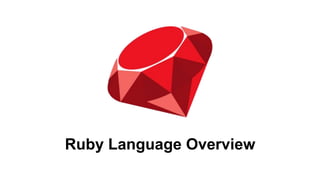

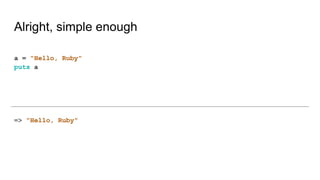
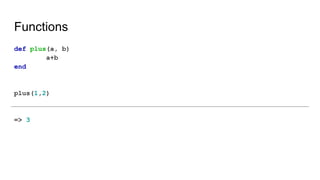
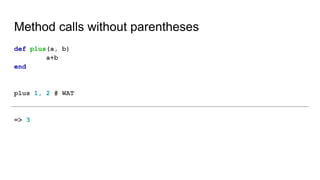
![Arrays, hashes, ranges
# List of string, float, string, int and hash
array = ["Hello", 3.14, "ruby", 1, {hello: "hi"}]
for i in array
puts i
end
>> Hello
>> 3.14
>> ruby
>> 1
>> {:hello=>"hi"}](https://image.slidesharecdn.com/0xyvmg2wrcas9uaz0dju-signature-da3b1296349789a0ad64ffbdfa6ace75bc9204241f328a30aaca54db6d760f2a-poli-170220153616/85/Ruby-language-overview-6-320.jpg)

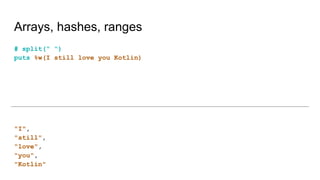

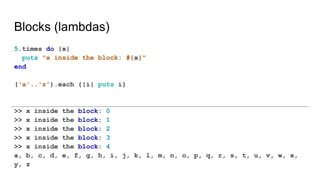
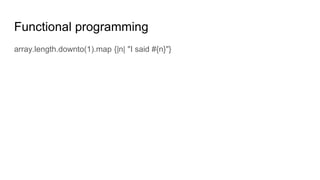
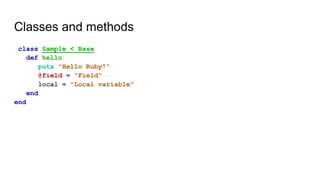
![Bonus
reponse = {
title: "Harry Potter and the Gradle Build",
description: "Book by J.K. Rowling",
attrs: {
pages: 192,
worth_reading: true
},
reviews: [ "Awesome!", "Great" ]
}
puts reponse.to_json
NoMethodError: undefined method `to_json' for #<Hash:0x007fcdb18f84b0>
from (irb):19
from /usr/bin/irb:12:in `<main>'](https://image.slidesharecdn.com/0xyvmg2wrcas9uaz0dju-signature-da3b1296349789a0ad64ffbdfa6ace75bc9204241f328a30aaca54db6d760f2a-poli-170220153616/85/Ruby-language-overview-13-320.jpg)
![Bonus (Extension functions)
require "json" #
...
puts reponse.to_json
{
"title": "Harry Potter and the Gradle Build",
"description": "Book by J.K. Rowling",
"attrs": {
"pages": 192,
"worth_reading": true
},
"reviews": [
"Awesome!",
"Great"
]
}](https://image.slidesharecdn.com/0xyvmg2wrcas9uaz0dju-signature-da3b1296349789a0ad64ffbdfa6ace75bc9204241f328a30aaca54db6d760f2a-poli-170220153616/85/Ruby-language-overview-14-320.jpg)